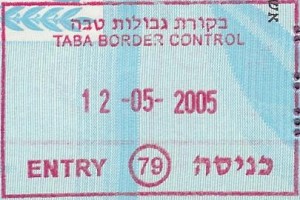 The Huffington Post, January 21, 2010
The Huffington Post, January 21, 2010
After spending over a week in a small, windowless room in Ben Gurion International Airport, Jared Malsin, the Jewish American editor of a Palestinian news agency, was deported to New York yesterday. The move brought Malsin’s legal battle to gain reentry into Israel and the Occupied Palestinian Territories to a sudden halt.
Malsin, who was residing and working in the West Bank, was detained by Israeli authorities at the airport on Tuesday, January 12, as he returned from a holiday in Prague. Malsin is the editor of the English section of Maan News Agency, an independent news service that focuses on local events. Maan is widely considered a reputable, unbiased source and receives over 3 million visitors a month.
Hebrew language court records obtained by Maan, which provided Malsin with legal representation, reveal that Malsin was deemed a “security risk.” The documents also mention writing by Malsin “criticizing the State of Israel” and articles produced “inside the [Palestinian] territories”, indicating that Malsin’s interrogators researched his work as a journalist and editor prior to his detainment.
Malsin appealed the decision and a hearing with a Tel Aviv judge was scheduled for Thursday, January 14. Due to the protests of American diplomats in Israel, Maan stated in a press release, the hearing was postponed to Sunday, January 17.
At the beginning of the week, Israel’s Ministry of Interior and Castro Daoud, Malsin’s attorney, stated their cases before Tel Aviv District Judge Kobi Vardi.
The Ministry of the Interior claimed that Malsin had been denied entry to Israel due to “lying to border officials”, “refusal to cooperate”, “reasons for arriving unclear” and “violated visa terms.”
Speaking to The Huffington Post, Ministry of Interior spokesperson Sabine Haddad explained: “When he [Malsin] arrived to the border, the authorities asked him to answer questions and he refused.” At that point, according to Haddad, security officials warned Malsin that he might be refused entry if he didn’t cooperate. Still, Malsin didn’t comply, Haddad said.
“The only reason he didn’t enter Israel is because he refused to cooperate,” she commented.
Daoud responded to Judge Vardi that none of the reasons cited by the Ministry of the Interior constitute a valid justification for the denial of entry, and that none signal that Malsin is a “security risk.”
And none of the allegations, Daoud said, trump the violation of press freedom that Malsin’s detainment and deportation point towards.
According to the Ministry of the Interior, however, press freedom isn’t the issue. Haddad remarked to The Huffington Post that when Malsin was initially denied entry to Israel: “We didn’t know he [Malsin] was a journalist… and even if we did, we had a right to ask questions.”
When asked about the documents that referenced Malsin’s articles authored “inside the [Palestinian] territories” and “criticizing the State of Israel”, Haddad denied such records exist and insisted that Malsin’s treatment was not politically motivated.
On Tuesday morning, Judge Vardi ruled that the matter warranted a hearing. That afternoon, however, Malsin unexpectedly dropped the appeal. Malsin’s attorney was not present when Malsin filed this final motion, sparking concerns that he’d done so under duress.
And according to the most recent report from Maan, it seems that is the case:
“None of this was my decision,” Malsin told Maan via phone from New York Thursday morning, just moments after his flight touched down. “There’s no such thing as a voluntary deportation. I was deported, period,” Malsin said, rejecting claims that he left by his own volition.
Regarding the papers he signed that effectively closed his case and finalized his deportation, Malsin, who does not read Hebrew fluently, told Maan, “I had no idea I was waiving anything, no clue.”
According to Maan, Malsin believed that he was signing documents that would keep his case active while allowing him to leave the airport’s detention facility.
Critics have blasted Malsin’s case as a grave violation of press freedom.
In a press release Mohamed Abdel Dayem of the Committee to Protect Journalists stated, “Israel cannot hide behind the pretext of security to sideline journalists who have done nothing more than maintain an editorial line that the authorities dislike.”
Aidan White, the General Secretary of the International Federation of Journalists, commented, “We condemn this intolerable violation of press freedom. The ban of entry in this case appears to be a reprisal measure for the journalist’s independent reporting and that is unacceptable.”
White continued, “This kind of interference has no place in a democracy.”